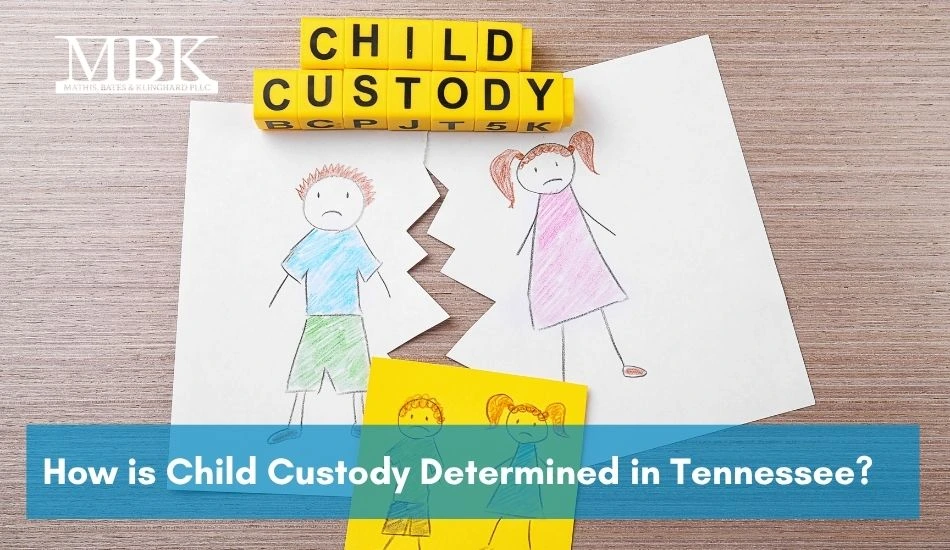|
|
Last Modified on Sep 15, 2025
Child custody is one of the most contentious issues that can come up during a divorce or in any parenting relationship. If you are going through a custody battle with your child’s other parent, you may be wondering, “How is child custody determined in Tennessee?” We can answer that question and more below.
50/50 Joint Custody
Tennessee recently passed a new custody law with the legal presumption that joint legal custody with a 50/50 split of parenting time is in a child’s best interests unless a judge decides otherwise. What that means is that the child will spend half their time with one parent and the other half with the other parent. How this arrangement gets worked out depends on the parents’ circumstances.
Exceptions to the 50/50 Rule
The presumption of joint legal custody is not a law in itself, and judges still have the discretion to alter custody agreements as they see fit to ensure that they prioritize the child’s best interests. Factors the judge may consider when making this determination include:
- Each parent’s relationship with the child
- The child’s needs and mental health
- Each parent’s ability to fulfill their responsibilities to the child
- The presence of domestic violence or emotional abuse
- The child’s preferences, if 12 or older
If one parent is deemed unfit to provide care for the child, the 50/50 custody split will not apply, and sole custody may be awarded to the other parent.
Why Hire a Child Custody Lawyer
If you and your co-parent disagree about any aspect of your parenting plan, you should hire a child custody lawyer. A child custody attorney can ensure that all steps are taken to protect your rights and the best interests of your child. Our team understands the complexities of Tennessee child custody laws and how they apply to your case.
You should not assume that the court will rule in your favor just because you believe you are more fit to provide care for your child than the other parent. In 2022, 22% of American children lived only with their mothers, while 5% lived only with their fathers.
In Tennessee, a study performed by Custody X Change shows that in 2018, prior to the adoption of the presumption of joint custody, fathers had custody of their children only 21.8% of the time. While it’s tempting to assume that this has changed, data has yet to be released showing how custody time is divided in the Volunteer State now that courts presume joint custody to be in the best interests of the child.
Types of Child Custody in Tennessee
To further complicate an already challenging subject, Tennessee has two types of child custody and two types of custody arrangements. They are:
- Legal custody. The legal custodial parent or parents make decisions about a child’s upbringing, including their education, medical care, and religion.
- Physical custody. Physical custody refers to the time-sharing arrangement between a child’s parents.
- Sole custody. When a parent is granted sole custody, they take full responsibility for the child’s upbringing. It’s sometimes the case that parents still have joint physical custody even when sole legal custody gets assigned to one parent over the other.
- Joint custody. When parents are issued joint custody, both share physical and/or legal custody of the child.
If a child’s parents are not married, legal and physical custody may default to the mother. In these cases, fathers must petition the court for custody and visitation rights.
Custody Order Modifications
Custody orders can be modified following a divorce in Tennessee, but only if circumstances warrant a modification. Examples include:
- Significant changes to parents’ working or living conditions
- Significant changes to a child’s needs, including those associated with age
- Allegations of child abuse
- Failure to follow the parenting plan or custody order
- A decision that the parenting plan is no longer in the child’s best interests
FAQs
What Is the New Child Custody Law in Tennessee?
The new child custody law in Tennessee includes a legal presumption that joint legal custody and equal parenting time are in a child’s best interests. Another recent change to Tennessee child custody law came in the form of a recent TN House Bill 0492, which requires the court to consider any failure to pay child support when making custody decisions.
What Is the Biggest Mistake in a Custody Battle?
The biggest mistake in a custody battle is failing to put the child’s best interests first. Poor communication and making inappropriate comments about the other parent in front of children can also lead to negative outcomes in child custody cases. No matter how you feel about your co-parent, you should not let those emotions get in the way of what is right for your child.
How Is Custody Determined in TN?
Custody is often determined in TN based on an established parenting plan. The plan should define each parent’s role, the child’s residential schedule, and how decisions will be made regarding education, healthcare, and upbringing. The courts will consider a child’s preferences if they are 12 years or older, but the primary concern will be the child’s best interests.
Q: Is Tennessee a 50/50 Child Custody State?
A: Tennessee is a 50/50 child custody state, but that doesn’t mean that all parents will share custody of their child in the exact same way. In the end, a judge still makes the final call regarding child custody, and they make the decision based on factors like each parent’s fitness, the child’s age, and the stability of each home.
Your Tennessee Child Custody Attorney
Understanding how child custody is determined in Tennessee can help you better prepare for your case and make informed decisions about your child’s future. Choose a lawyer you can trust to provide effective legal counsel and support. The team at Mathis, Bates & Klinghard PLLC has been practicing family law for years. We have handled all kinds of child custody cases, and we can help with yours, too. Contact us to schedule an initial consultation today.








